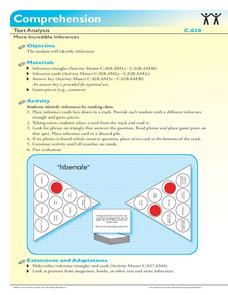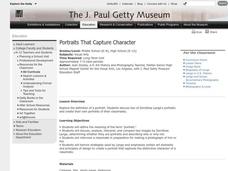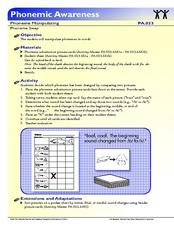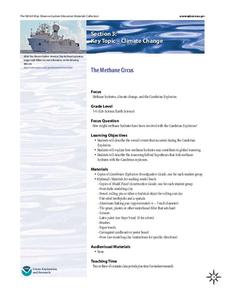Wind Wise Education
Understanding Forms and Sources of Energy
What is the difference between a form of energy and a source of energy? This first activity in a series of 19 lessons uses demonstrations and discussions to introduce energy to the class. Through using hand-generator flashlights,...
WindWise Education
Can We Reduce Risk to Bats?
It is just batty! A resource outlines a case study scenario of reducing the risk to bats. Teams learn about the bat populations in the area of the wind farm, then research and propose a solution.
Southern Poverty Law Center
Evaluating Reliable Sources
A lesson plan instills the importance of locating reliable sources. Scholars are challenged to locate digital sources, analyze their reliability, search for any bias, and identify frequently found problems that make a source unusable.
Florida Center for Reading Research
Phonological Awareness: Onset and Rime, Quick Pick
What does it begin with? In this engaging phonics game, small groups study onset and rime using picture cards. Groups take turns as one player draws three cards from an overturned pile, placing them face-up on the table. They silently...
Florida Center for Reading Research
Comprehension: Monitoring for Understanding, Simple Summary
Can your class sum up a text in a few sentences? Help them build this skill by starting nice and slow. For this summarizing activity, the teacher marks the main ideas with sticky notes. Learners read and reread the text, pausing at the...
King Country
Lesson 26: HIV/AIDS & Other STDs - Day 3: HIV/AIDS
The third lesson in the three-part series on HIV/AIDS and other STDs considers how these diseases are passed, how to protect against them, and risky and safe behaviors. The discussion of condom use and sexual behaviors are explicit.
Florida Center for Reading Research
Comprehension: Text Analysis, More Incredible Inferences
Reinforce inference skills with a learning game! Scholars read scenarios on cards and match them to a written inference on the triangle. The first pupil to match all their inferences wins!
J. Paul Getty Trust
Portraits That Capture Character
One of the great things about technology is that it lets youngsters visit museums that may be many miles away. With this resource, middle and high schoolers can visit the portrait galleries at J. Paul Getty Museum, located in Los...
Federal Reserve Bank
Monster Musical Chairs and Scarcity
Why can't we have everything we want? Youngsters are introduced to the concept of scarcity through a game of musical chairs and by discussing what it takes to satisfy our wants.
Curated OER
Poly-Mania
This hands-on lesson takes young geometers on a tour of 2D polygons and 3D polyhedrons. After exploring different web resources and discussing geometric shapes, small groups construct models of polyhedrons using bendable straws. Note:...
National Institute of Open Schooling
Alcohols, Phenols and Ethers
Classes continue their study of organic compounds in a detailed lesson covering alcohols, phenols, and ethers. Naming these compounds, classifying them, and describing their preparation and use are some of the topics covered. Through...
Annenberg Foundation
America's History in the Making: Using Digital Technologies
How can digital technology of today link us to the events of the past? Scholars use technology to uncover the vast number of historical resources available in lesson 12 of a 22-part America's History in the Making series. Using databases...
Federal Reserve Bank
Once Upon a Dime: High School Lesson Plan
Who knew that fairy tales and economics go hand-in-hand? Pupils complete a host of handouts, using everything from graphic organizers to short answer questions to reinforce concepts. They also complete a project that builds on everything...
Curated OER
Write Right!
After watching part of a Club Write Kids video and discussing the editing process, each group of learners writes a letter to a favorite author. They ask for a copy of a page of manuscript that has gone through the editing process. Prior...
Foreign Policy Research Institute
Teaching the 9/11 Anniversary
Here is a lesson on terrorism and 9/11. While outdated, it could be easily revised for today's teens. It includes targeted vocabulary, a background information activity, critical thinking questions, and step-by-step procedures for...
Curated OER
STD & AIDS, Day 2: Sexually Transmitted Diseases (STDs)
Keep your secondary special education class informed and aware of STDs, HIV, and AIDS. They learn what STD stands for, how STDs are transmitted, and how to protect themselves. A case study, note to care provider, handouts, transparency,...
Florida Center for Reading Research
Phonological Awareness: Phoneme Manipulating, Phoneme Swap
Reading readiness can be a fun skill to foster. Scholars manipulate phonemes to change one word into another. They pick picture cards, say the object's name on the card, then change the final phoneme to create a new word. They then find...
Pulitzer Center
China's Rising Labor Movement
Young historians will explore the complex causes and effects of industrialization in China by perusing the numerous articles included in this webpage. Throughout the resource, there are many writing and discussion prompts to help direct...
National Geographic
Altitude: What's in the Air?
Introuduce your scientists to the differences in air at varying altitudes with a colorful explanatory graph. After some discussion, they view unbelievable footage of mountain-climbing Leo Houlding and a narrative about how he might do...
King Country
Lesson 13: Communication - Day 6: Decision-Making
Decision making, including decisions that are made for us by others, decisions that are easy to make, and those that are not are the focus of a skill-building lesson that provides class members with a four-step decision-making model....
NOAA
The Methane Circus
Step right up! An engaging research-centered lesson, the third in a series of six, has young archaeologists study the amazing animals of the Cambrian explosion. Working in groups, they profile a breathtaking and odd creature and learn...
Florida Center for Reading Research
Fluency, Connected Text, Computer-Based Reading
Scholars take to computers or devices to boost reading skills using educational software or websites.
Curated OER
Examining Abstinence
Highschoolers investigate the concept of abstinence and how it is considered the safest expression of teen sexuality. Guiding questions are used to help students through the lesson plan. There are many components to this lesson plan...
Curated OER
Safer Sex - Lesson 1
High schoolers investigate the practices related to safer sex and define what it means in our society today. Guiding questions are used to facilitate classroom discussion. The goal is for high schoolers to define and identify the...
Other popular searches
- Media Education
- Media Education Propaganda
- Media Education Esl
- Lesson on Media Education
- On Line Media Education
- Media Education Lesson Plans
- Media Education Tabloid
- Online Media Education
- Media Education Math
- Media Education Blogging
- Media Education Art Projects
- Media Education Blagging

























